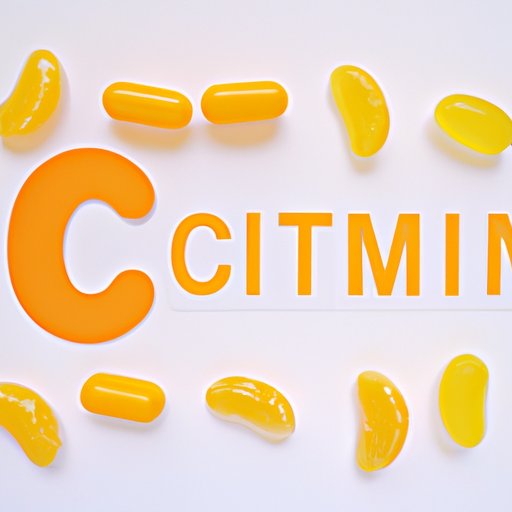
Introduction
Vitamin C, also known as ascorbic acid, is a vital nutrient that plays an essential role in maintaining optimal health. It is a powerful antioxidant that helps protect the body against cellular damage, supports the immune system, and aids in collagen formation. While most people know that Vitamin C is essential for overall health and wellbeing, many are unsure of how much they need to consume each day. In this article, we’ll explore how much Vitamin C you need, the benefits of Vitamin C for optimal health, and practical tips for meeting your daily requirements.
The Optimal Dose: Understanding How Much Vitamin C You Really Need
When it comes to determining how much Vitamin C you need, there is no one-size-fits-all answer. The optimal dose of Vitamin C can vary depending on a range of factors, including age, gender, and health status. For example, pregnant and breastfeeding women may require higher doses of Vitamin C to support the growth and development of their babies. Older adults may also require more Vitamin C to maintain good health.
Vitamin C: Daily Requirements and Benefits for Optimal Health
So, how much Vitamin C do you need each day? According to the National Institutes of Health, the recommended daily intake of Vitamin C for adults is 75-90 milligrams. This amount can be easily obtained through a healthy, balanced diet that includes plenty of fruits and vegetables.
Vitamin C provides a range of benefits for optimal health. It supports immune function by helping to produce white blood cells that fight infection and protect the body against disease. It also aids in the production of collagen, which is essential for healthy skin, bones, and cartilage. Plus, Vitamin C is a powerful antioxidant that helps protect the body against cellular damage caused by free radicals.
Why It’s Important to Get Enough Vitamin C: Recommended Intake Made Simple
Neglecting to get enough Vitamin C on a daily basis can lead to various health problems. Vitamin C deficiency can cause a range of negative impacts, including fatigue, joint pain, and skin problems. In severe cases, a lack of Vitamin C can lead to scurvy, a rare but potentially fatal condition characterized by fatigue, muscle weakness, and swollen gums.
So, how can you make sure you’re getting enough Vitamin C each day? One simple way is to include plenty of Vitamin-C rich foods in your diet. Some of the richest sources of Vitamin C include citrus fruits (such as oranges and grapefruit), kiwi, broccoli, and red peppers. It’s also essential to note that overcooking or overheating foods may result in the loss of Vitamin C, so it’s essential to choose cooking methods that preserve the nutrient content of your foods.
Vitamin C: The Benefits and Risks of Taking Too Little or Too Much
Taking too little or too much Vitamin C can result in various consequences. While mild deficiencies can lead to negative impacts like skin problems and joint pain, taking too much Vitamin C can lead to gastrointestinal discomfort, diarrhea, and kidney stones. It’s vital to balance your intake carefully to prevent these negative consequences. Avoid supplements that contain ascorbic acid in mega-doses; instead, try to consume Vitamin C through diet or low-dose supplements.
Unlocking the Power of Vitamin C: How Much is Enough to Boost Your Immune System?
Vitamin C is a powerful immune booster. It promotes the production of white blood cells known as lymphocytes and phagocytes, which help the body fight against infection. Taking regular doses of Vitamin C can also help to reduce the length and severity of common cold symptoms. While the recommended daily intake of Vitamin C for adults is 75-90 milligrams, taking higher doses may provide additional immune support. Some studies suggest that taking 500-1000 milligrams of Vitamin C per day can provide enhanced protection against infections.
From Citrus to Supplements: Meeting Your Daily Vitamin C Intake for Vibrant Health
There are many ways to meet your daily Vitamin C requirements. Consuming a diet that is rich in fruits and vegetables is an excellent way to nourish your body with the nutrients it needs. Citrus fruits like oranges, grapefruits, and lemons are especially good sources of Vitamin C. Red peppers, strawberries, broccoli, and kiwi are also high in Vitamin C. In addition to dietary sources, some people may consider supplementing with Vitamin C to meet their daily requirements. When taking supplements, it’s essential to follow the recommended dosage guidelines and seek advice from a healthcare professional.
Conclusion
Vitamin C is a vital nutrient that plays an essential role in overall health and wellbeing. It’s crucial to include plenty of Vitamin-C rich foods in your diet or low-dose supplements to ensure you meet your daily requirements of this nutrient. Getting enough Vitamin C can help support immune function, promote collagen formation, and protect the body against cellular damage. By following the tips outlined in this article, you can harness the power of Vitamin C and unlock the vibrant health benefits it has to offer.




